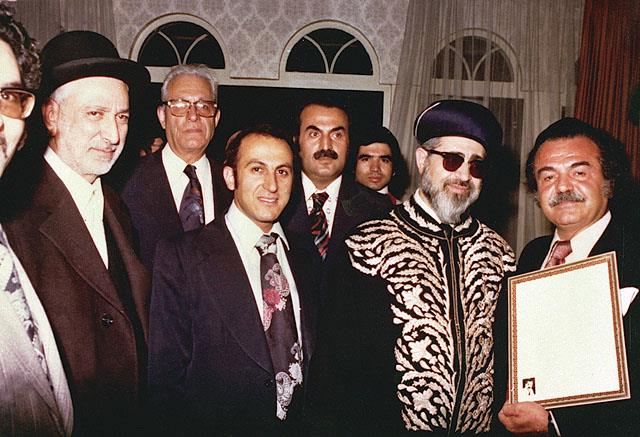
עובדיה יוסף
Ovadia Haim Yosef (1920-2013), rabbi, the Sephardi Chief Rabbi of Israel and one of the foremost Talmudic authorities of his generation, born in Baghdad, Iraq, with the name Ovadia Yosef Ovadia, or Abdullah Youseff in Arabic. At the age of four, Yosef immigrated with his family to Palestine, then under British Mandate, where they settled in Jerusalem. At age of 20 he received rabbinical ordination from Rabbi Ben-Zion Ouziel. In 1945 he was appointed a dayan (judge) of the Sephardi Bet Din (rabbinical court) in Jerusalem.
One of the principle pathways Yosef adopted in his approach to Jewish law was leniency, which he believed was preferable to stringency. He noted in particular that in the modern generation, ruling stringently could have the effect of discouraging any compliance with Jewish law, and that lenient rulings were therefore advisable. In one of his most well-known rulings, Yosef liberated almost 1,000 women from the halachic status of an aguna, or a “chained woman,” by allowing partial testimony and evidence to determine a soldier’s death.
In1947, Yosef moved to Cairo, Egypt where he was elected head of the Bet Din and also became deputy chief rabbi of Egypt. Ovadia published his first work at the age of 18 in Cairo, and while there he refused to speak against the State of Israel and forbade Jewish contributions to the Egyptian military. He also insisted on his right to speak in Hebrew. After the State of Israel was etablished in 1948, Yosef returned to Israel and was appointed a member of the rabbinical court of Petah Tikva. From 1958 to 1965, he held the same position in Jerusalem. In 1965, he was appointed a member of the Supreme Rabbinical Court of Appeals in Jerusalem and in 1968, he attained the role of Sephardi Chief Rabbi of Tel Aviv-Yaffo. He was awarded the Israel Prize for Torah literature in 1970 in recognition of both the quality and quantity of his work.
In 1973, Yosef was appointed as the Sephardi Chief Rabbi of Israel (also known as the Rishon le-Zion) by a majority of 81 to 68 votes, replacing Rabbi Yitzhak Nissim. In 1984, he became spiritual mentor of the Shass political party. He wielded enormous influence among Israeli Jews of Middle Eastern and North African ancestry, and had frequently been a kingmaker in the country's fickle coalition politics.
Yosef was a controversial figure, also known for his frequent outbursts regarding public figures, political concerns and current affairs, while Shas’s political tactics often generated animosity among the secular public and contributed towards increasing societal division on religious grounds.
Rabbi Ovadia Yosef passed away in October 2013; his funeral in Jerusalem attracted approximately 800,000 people from across Israel - 10% of Israel's total population - and is considered one of the largest gatherings of Jews in recorded history.